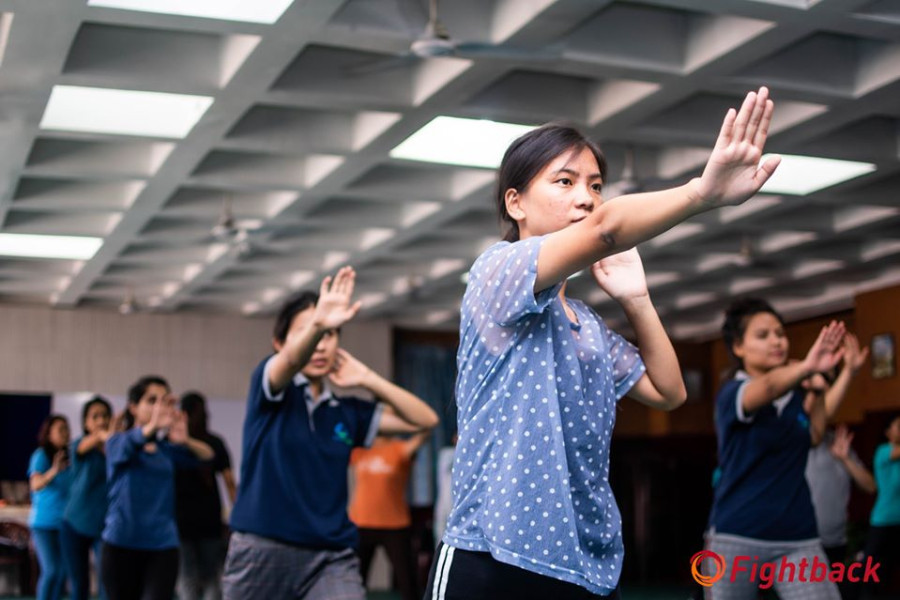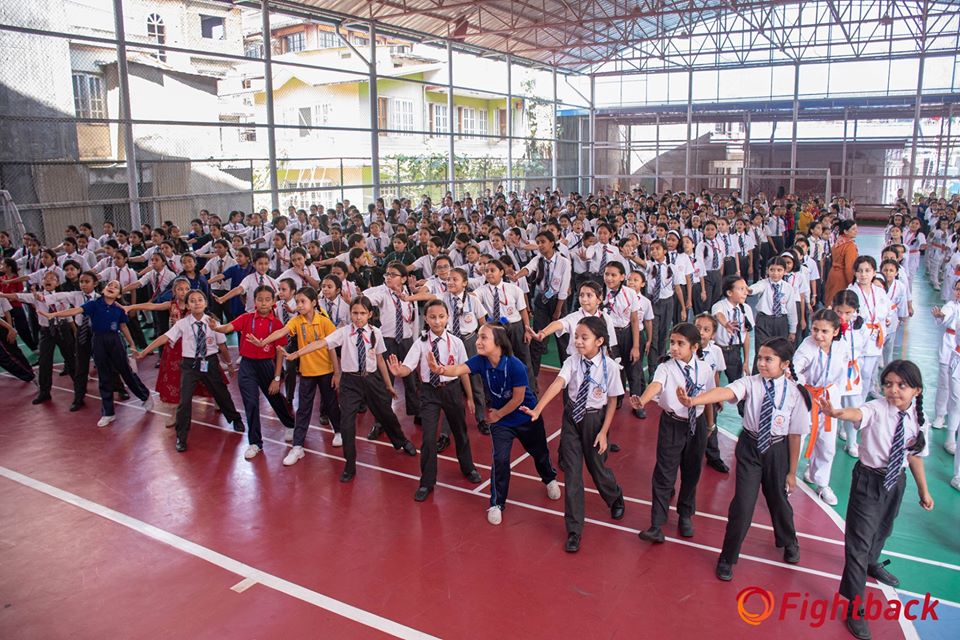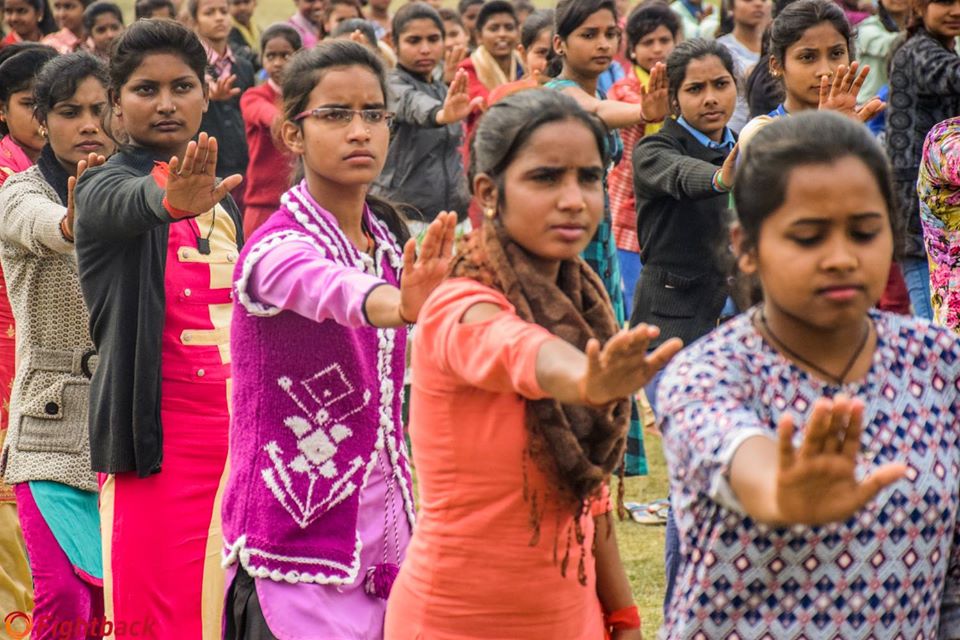Life & Style
How this social enterprise is sensitising society’s approach towards harassment
Fightback, since its inception in 2013, has not only been teaching martial art techniques to students but also vocal and mental skills that would help them take power away from perpetrators.
Elisha Shrestha & Ankit Khadgi
Anugya Ojha was 11 years old when she got to know about self-defence courses at her school. At that time, she took a three-day intensive safety training course initiated by Fightback, a self-defence training enterprise, just because it was part of her school’s extracurricular activities. Fourteen-year-old Ojha today realises how that ‘empowerment self-defence’ course she took three years ago has shaped her understanding about sexual violence.
“There have been times when I have faced verbal abuses, uncomfortable stares, and random guys passing comments while walking alone on the streets which is intimidating at times,” says Ojha, who enrolled herself in the training programme five months ago again and plans to join it again if she gets the opportunity. “But what I learned at the programme has taught me to feel less intimidated when I face an unwelcome situation.”
In the self-defence training classes, which go on for 6-8 hours a day, Ojha, along with 50 other girls, were not only taught basic martial art techniques to defend themselves against physical attack but were also taught vocal and mental skills that would help them take power away from perpetrators.
Starting from 2013, Fightback has been training and educating students, as well as working men, women, and vulnerable population, about how to mitigate risks of being subjected to sexual harassment and how to deal with the issue sensitively. Beyond physical tactics, the classes teach participants how to speak up, respond assertively to prevent, manage and mitigate their risk of experiencing violence, including sexual assault, as well as involve the stakeholders in making them realise the importance of respecting others' consent.
“We use a holistic approach to self-defence, incorporating physical, vocal, and mental techniques to deal with managing and defusing potentially dangerous situations,” said Vikrant Pandey, the founder of Fightback programme.
According to Pandey, the Fightback programme is not only about teaching young girls and boys, even adults, self-defence to protect themselves from potential perpetrators, but it is only about providing physical empowerment and psychological benefits to them in a society where the onus is always laid on the survivor.
Such programmes are critically needed in a country where sexual harassment and violence is pervasive. The rape and murder of 13-year-old Nirmala Pant in July 2018, which caused an unprecedented national outcry, encapsulated just how unsafe Nepal is for women. According to Nepal Police, there has been a sharp increase in the percentage of reported rapes in the country. Ten years ago, 309 rape cases were reported to the police in a year, which increased nearly fourfold in the past decade, resulting in 1,873 rape cases in the fiscal year 2018/2019.
However, talking about sexual harassment is still considered taboo in Nepali society, and with the victim-blaming culture deeply embedded, along with no serious repercussions for the perpetrators to hold them accountable, many survivors become reluctant in coming forward with their experiences.
But according to Pandey, that’s not the only problem with Nepali society’s views on sexual harassment. They still believe that sexual harassment only happens physically, failing to acknowledge to see sexual harassment as a spectrum, he says.
And this is where his social enterprise, Fightback, is working—to make more and more people sensitive towards issues of sexual harassment and to break the conventional notions of it. “We try to improve the understanding of the people and inform them that a person can be harassed verbally, non-verbally as well in the online space,” he says

Visiting schools, both in urban and rural areas, as well as training people working in various institutions, Pandey, along with his team, prepares the design of the programme based on the nature of the institution they are visiting. While, according to Pandey, since sexual harassment is a sensitive topic and requires a nuanced understanding, the training is tailored according to the requirement of the institution and can last from a day’s training to a month’s.
The sessions themselves are divided into two parts: physical training and mental/vocal training. “In the physical training session, which is conducted by a trained martial arts teacher, we facilitate the participants by teaching them easy-to-remember, hard-to-forget self-defense moves,” says Pandey. “Likewise, in the mental/vocal training programme, we help participants identify if they or the people they know are getting harassed, and how they can tackle the situation or seek help,” says Pandey. Currently, the sessions are being held virtually.
Although the enterprise started out by focusing on providing training to girls and women, who are mostly victims of sexual harassment, since 2016, the enterprise started involving boys/men as well as parents and teachers in their programme, intending to sensitise the issue in a larger mass, says Pandey.
The other major focus of the programme is to address the issue of sexual harassment at its core, which most self-defense training programmes often miss out on. The programme ensures issues of toxic masculinity are discussed. It also addresses how our culture is plagued by notions that normalises sexual violence and instead protects perpetrators by blaming the survivors.
“Our main intention has always been to break the mindset of people who put the blame on the survivors, for the violence done by the perpetrators, and make them feel and realize that it’s never the survivor's fault,” says Pooja Gurung, a mental/vocal trainer at Fightback.
But this is also the toughest part of their initiative, says Gurung, as many participants are still guided or enforced with the notion that it’s always the survivor's fault, as that’s what our society believes in. “It’s difficult for us at the beginning to make the participants understand that things which society has been normalising are in fact harassment,” says Gurung.
Likewise, many participants still can’t tell whether a behaviour is problematic or not and there is also a reluctance in participants coming up and talking about sexual harassment, says Gurung. And to make participants feel that they are safe and can share their experiences, Gurung begins the session by sharing her own experiences.
“I try to make sure that the participants are comfortable, as talking about one’s personal experience as well as learning about sexual harassment can be a difficult experience for many,” says Gurung, who also focuses on making the participants realise how no person has the right to cross their boundaries and that their consent should get valued.

Until now, Fightback has trained more than 15,000 girls/women and 3,500 boys/men in almost 25 districts in Nepal. Likewise, they also frequently collaborate with various corporate houses, banks, and have also trained vulnerable populations like visually impaired women and those who are working in the entertainment sector.
A 2019 study conducted by Coffey International on the model Fightback follows and found out that this kind of training works in physically and psychologically empowering girls. According to the study, there was a 97.2 % increase in mental safety skills, a 94% increase in vocal safety skills, and a 96% increase in self-defense skills among 1091 school girls after completing the fightback programme.
However, working in a country, that is plagued by patriarchy and normalises rape and harassment culture, comes with owns struggle.
“Although more and more people are understanding the importance to talk about sexual harassment sensitively, there is still a reluctance among people to address these issues,” says Pandey. According to him, even though many schools are inviting the enterprise to train their students, they think and treat it as a part of extracurricular activities, failing to consider it as a pertinent subject that should be compulsorily taught in the regular curriculum.
And then there are parents who don’t show eagerness in their children's participation in self-defence courses. “We try to make parents more involved in the programme, inviting them for the meeting to discuss the issues their wards are tackling and also to have an open conversation on sexual violence and harassment. However, not many parents participate in such meetings,” says Pandey.
Similarly, the normalisation of stalking and in consideration of consent is so deeply embedded in the mindset, that it’s difficult for boys and men to make them realise that some of their behavior is problematic at the core while having sessions with them, says Gurung.
“While conducting many sessions with many young boys, we have encountered that there’s a common understanding among them that it’s ‘cool’ to tease girls,” she says.
However, the enterprise makes sure that the boys (participants) realise that such a mindset is disrespectful through discussions, says Gurung, who has been working with the enterprise for the past four and half years.
For Ojha, Fightback was a life-changing experience that made her more confident.
“Although physically tackling the person may not be possible all the time but after joining Fightback, I have learned that I can tackle the situation by seeking out help and also that it is the perpetrator's fault, never mine,” she says.




 16.16°C Kathmandu
16.16°C Kathmandu (1).jpg)











